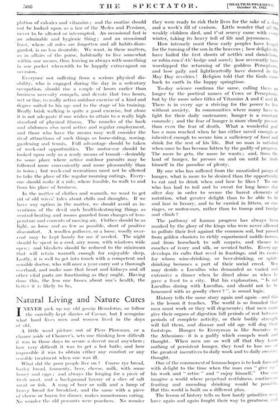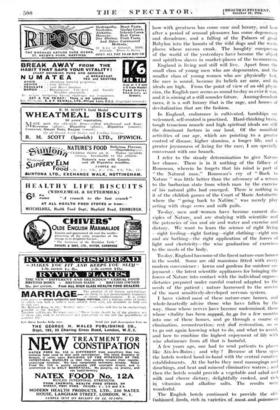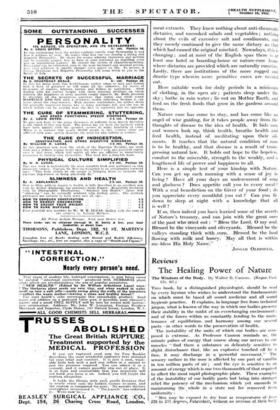Natural Living and Nature Cures
INEVER pick up my old gossip Herodotus, or follow the carefully-kept diaries of Caesar, but I recognize what luml lives men and women lived in the days of old.
A little word picture out of Piers Plowman, or a chance aside of Chaucer's, sets one thinking how difficult it was in those days to secure a decent meal anywhere; bow very difficult it was to get a hot bath; and how impossible it was to obtain either any comfort or any sensible treatment when one was ill.
What did the poor people live on ? Coarse rye bread, barley bread, frumenty, beer, cheese, milk, with .Some honey and eggs ; and always- the longing for a piece of fresh meat, and a background luxury of a slice of salt meat or lisp. A mug of beer or milk and a lump -of- heavy bread for breakfast, and the same with a piece of cheese or bacon for dinner, makes monotonous eating. No wonder the old peasants were poachers; No wonder they were ready to risk their lives for the sake of a deer and a week's fill of venison. Little wonder that all the weakly children died, and that ,scurvy .came with every winter, taking its heavy toll of life and joyousness.
How intensely must these early peoples have longed for the turning of the sun in the heavens ; how delightedly have hailed the first shoots of nettles and dandelions, or robin-run-i'-th'-hedge and sorrel; how reverently have worshipped the returning of the goddess Persephone, and how gaily and lightheartedly have danced in the May Day revelries ! Religion told that the Gods came back to earth in the happy springtime.
To-clay science confirms the same, calling them no longer by the poetical names of Ceres or • Persephone, but by the more sober titles of Vitamins A and C and I). There is in every age a striving for the power to live without anxiety. In communities where many have to fight for their daily sustenance, hunger is a constant comrade ; and the fear of hunger is More 'closely present than even the fear of death. What a wonderful goal has a man reached when he has either saved enough or inherited enough to secure him a sufficiency of food and drink for the rest of his 'life. But no man is satisfied when once he has become bitten by the gadfly of progres4. The more he gets, the more he wants.; and, from the land of hunger, he presses on and on until he finds himself in the paradise of plenty.
By one who has suffered from the unsatisfied pangs of hunger, what is more to be desired than the opportunity- to eat and to drink when and how he likes ? To one who has had to toil and to sweat for long hours day after day in order to secure the barest elements of nutrition, what greater delight than to be able to lie and laze in luxury, and to be carried in litters, or car- riages, or motor-cars, rather than to tramp aril trudge and climb ?
The pathway of human progress has always been marked by the glory of the kings who were never_allowed to pollute their feet against the common soil, but -passed from golden chariots to richly caparisoned saddle-horses, and from horseback to soft carpets, and thence to couches of ivory and silk, or scented baths. Every age develops its cults that revel in feastings, and its castes for whom wine-drinking, or beer-drinking, or spirit- drinking becomes a part of their social creed. Men may deride a Lueullus who demanded as varied and extensive a dinner when he dined alone as when he gave a feast to a city. _ But his explanation, " Is not Lucullus. dining with Lucullus, and should not he he honoured with as goodly cheer ? ", is sound logic.
History tells the same story again and again—and this is the lesson it teaches. The world is so founded that men must work or they will degenerate; that men 'mist give their organs of digestion full periods of rest between periods of complete activity, or their bodily strength will fail them, and disease and old age will dog their footsteps. Hunger to Everyman is like Socrates to the Athenians—it is a gadfly which compels work and thought.. When men are so well off that they know nothing of persistent hunger, they tend to lose one Of the greatest incentives to daily work and to daily creative thought. One of the commonest of human hopes is to look forward with delight to the time when the man can " give his work and " retire " and " enjoy himself." One can imagine a world where perpetual restfulness, continuous feasting and unending drinking would be possible. But this world is built on a different plan. - - - The lesson of history tells us how hardy primitive 111Vil have again andagain fought their way to greatness, and how- with - greatness has come ease and luxury, and -how -after a period of sensual pleasures has come degeneracy ' and decadence, and a falling of the Palates of great Babylon into the haunts 'Of. the wild dogs and the waste places where ravens croak. _ The haughty conquerors of the world of the yesterdaYs have become the abject and spiritless slaves in market-places of the to-morrows.
England is living and still will .live. Apart from the small claSs of young"men who are: degenerates,' and the smaller class of young women who are physically lost, the race is sound, because its -beliefs . are sane; and its ideals are high. From the point of view of an-old physi- cian, the English race seems as sound to-day as ever it was, and it is aiming at a still sounder flittire. - Aniohg decadent races, it is a, soft luxury that is the rage, and houses of devitalization that are the fashion. .
In England, endurance is cultiVated, hardships are welcomed, self-control is practised. Hard-thinking brain, tough tenacious muscle and high spiritual ideals are still the dominant factors in our land. Of the manifold activities of our age, which are pointing to a greater control of disease, higher stamina, a longer life, and a greater joyousness of living for the- race,. I am specially conversant with one branch. .
I refer to the steady determination to give-Nature her chance. There is in it nothing of the fdllacy of Rousseau, wherein he forgets that his mind is part of " the Natural man." Rousseau's cry of " Back to N-iture " was little better than the advocacy of a return to the barbarian state from which man by the exercise of his natural gifts had emerged. There is nothing in it of the childish games of the Court of Marie Antoinette where the " going back to Natlink" was merely play acting with stage cows and milk pailS.
To-day, men- and–women have become earnest ills-. ciples of Nature, _and, are studying with scientific zeal the potencies of Sim and air and water and exercise and dietary. We want to learn the science of right living —right feeding—right fasting—right clothing—right sun and air bathingthe right application` ofthe forces of light and electricity-the • wise' graduation of exercises to the needs of the body.
To-day, England has some of-the finest nature-cure homes ill the world. Some are old mansions fitted with every modern convenience : lawns and gardens for outdoor en- joyment : the latest scientific appliances for bringing the forces of Nature into contact with the individual organs : dietaries prepared under careful control adapted.. to the needs of the patient : nature harnessed, to the service of the most sensitively-developed nervous system. I haVe visited most of these. nature-cure hoMes, and whole-heartedly advise those, who have fallen by the way, those whose nerves have become undermined, those. whose vitality- has been sappaiLtsi...go for a .few months into one of these homes, and go through a course of eliminatiOn, reconstruction,- rest and restoration, so as to go out again knowing what to do, and- what to avoid, and how to combine the highest- enjoyment of life with wise abstinence from all that is harmful. 'A few years ago, one had to send patientS to places like Aix-les-Bains ; and why ? Because at these spas the hotels worked hand-in-hand with the central curative eStablishinents. At the baths they used massagings and douchings, and heat and mineral eliminative waters ; and then the hotels would provide a vegetable and salad and milk and cheese dietary, delightfully cooked, and rich. in vitamins and alkaline salts. The results were wonderful.
The English ,hotels continued. to provide the oltl ff,lohiqued, ,foods, varieties .of...meat–and–poisono us meat extracts. They knew nothing about anti-rheumatic dietaries, and uncooked salads and vegetables ; notlUng about the evils of -excessive salt and condiments, and they merely continued to give the same dietary as that Which had caused the original mischief. Nowadays, this is changing ; and at inOSt of the English spas there is at least one hotel or boarding house or nature-cure home where dietaries are provided Well are naturally curative.ra tat. Lastly, there are institutions of the more rugged drastic type wherein more primitive cures are carried out.
Here suitable. work for daily periods us a minimum of clothing, in the open air ; patients sleep under the sky ; bathe in rain water ; lie out on Mother Earth, and feed on the fresh foods that grow in the gardens around them.
Nature cure has come to stay, and has come like an angel of wise guiding, for it takes people away from the thoughts of disease to the idea of health. It bids men and women look up, think health, breathe health and feed health, instead of meditating upon their ail- ments. It teaches that the natural condition of man is to be healthy, and that disease is a result of trans- gressing- natural law. It holds out hope to the hopeless, comfort to the miserable, strength to the weakly, and a lengthened life -of power and happiness to all.
Here is a simple test of your kinship with Nature. Can you get up each morning, with a sense of joy iii living ? Have all your days an undercurrent of song and gladness ? Does appetite call you to every meat? With a real benediction on the Giver of your food ; do you appreciate every mouthful you eat ? Can you lie down to sleep at night with a knowledge that all is well ? - - • If so, then indeed you haVe learned some of the secrets of Nature's treasury, and can join with the great ones of the past who' dried out : Bless- the Lord, 0-my soul. Blessed be. the- vineyards- and oliveyards. Blessed_ be the valleys standing thick with _corn. _Blessed be the land flowing with milk and honey. May all that is within me 'bless His Holy Name.- Jos lAll OLDFIELD.




























































 Previous page
Previous page